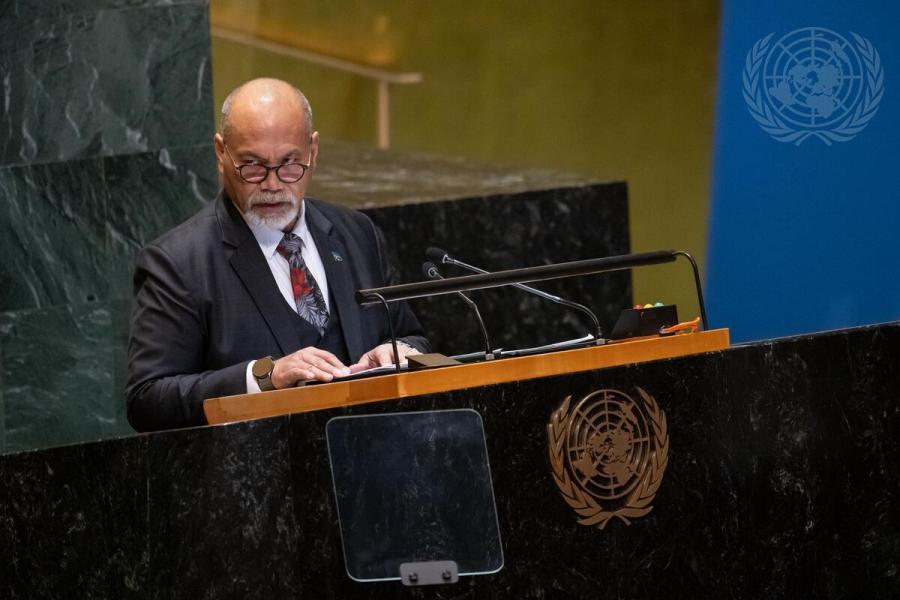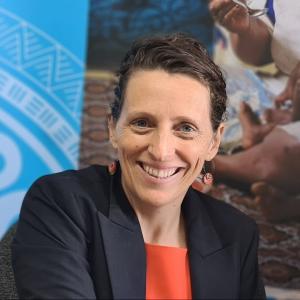A Milestone for Justice: Spotlighting the Importance of Judicial Well-being
11 April 2025
Justice is only as strong as those who uphold it. Faced with challenges to judicial independence and integrity, it is crucial to support those tasked with delivering justice. The recent adoption of the UN General Assembly resolution proclaiming 25 July as the International Day for Judicial Well-being is a game-changer. This historic move, led by the Government of Nauru with the backing of the UN Office on Drugs and Crime (UNODC), cements global recognition of the fundamental role judicial well-being plays in upholding the rule of law.

From Pacific Vision to Global Action
This resolution is the culmination of a global effort that first gained ground in the Pacific. Sparked by an idea from Justice Rangajeeva Wimalasena, the President of the Court of Appeal of Nauru in 2023, the initiative gained momentum through extensive collaboration with diverse stakeholders, including UNODC, members of the Global Judicial Integrity Network. The result was the Nauru Declaration on Judicial Well-being, composed by nearly 20 judicial leaders and stakeholders from Canada and Ukraine to the Caribbean, Singapore and beyond. Adopted in Nauru on 25 July 2024, the Declaration highlights the urgent need to address the physical, mental, and emotional health of judges – without which independence, impartiality, and integrity cannot thrive.
Why Judicial Well-being Matters
Judges carry immense responsibility, with their decisions shaping lives, communities, and generations to come. Indeed, the judiciary plays a fundamental role in safeguarding vibrant democratic societies, alongside the legislative and executive branches of government. However, this responsibility comes with pressure, isolation, and even threats to judges’ safety, which could have severe repercussions on their lives. According to a study by UNODC’s Global Judicial Integrity Network, which gathered responses from participants in 102 countries, 76% of judges and members of the judiciary do not maintain optimal physical and mental well-being, often due to massive workloads, burnout or stigma around judicial stress. The Nauru Declaration and the UN resolution recognizes this and advocates for systemic support for judges, reinforcing that judicial well-being is not a privilege – it is a necessity for strong, independent legal systems.
The Declaration draws from a wealth of international documents and practices that call for the safeguarding of judicial integrity. For example, the Bangalore Principles of Judicial Conduct emphasize competence, diligence, and integrity as critical for the protection of democracy and human rights. And Article 11 of the United Nations Convention against Corruption (UNCAC) likewise highlights the role judicial integrity plays in tackling corruption. A judiciary that is supported and resilient is far better equipped to resist undue influence and maintain public trust – and this resilience is rooted in the well-being of justices.
“When I began efforts to help judges manage stress and achieve a balanced mind, judicial well-being was barely recognized, often met with scepticism, and considered a taboo topic,” said Justice Wimalasena. “I realized that judicial stress is a global issue affecting both small and large judiciaries. Today, I am hopeful that the seven principles enshrined in the Nauru Declaration on Judicial Well-being will serve as a global catalyst, empowering judiciaries to support their judges in delivering quality justice.”
What Comes Next?
The adoption of the UN resolution is only the beginning. UNODC is committed to continuing its support for judicial well-being through practical tools, resources, and dialogue. A significant next step is the International Conference on Judicial Integrity and Well-being, set to take place in Papua New Guinea in August 2025. This event will build upon the momentum of the Nauru Declaration, bringing together judicial leaders, policymakers, and experts to turn commitments into concrete steps.
The road to stronger, healthier judiciaries is a shared responsibility and an integral component of SDG 16: Peace, Justice and Strong Institutions, which aims to provide access to justice for all and build effective, accountable and inclusive institutions at all levels. As we mark 25 July on our calendars, let it be more than just a day of acknowledgment. Let it be a rallying cry for ensuring that those who protect justice are, in turn, protected themselves.
For more on the Nauru Declaration and the movement for judicial well-being, visit:
UN General Assembly Resolution on International Day for Judicial Well-being
Nauru Declaration on Judicial Well-being


Tapan Mishra
Mr. Mishra served as the United Nations Resident Coordinator (UN RC) for Mongolia from September 2019 to December 2024. As UN RC, the highest-ranking representative of the United Nations Development System in Mongolia, he had been designated by the UN Secretary General to lead the UN Country Team in coordinating operational activities for development in the country. For his distinguished service of over 5 years in Mongolia, he received the highest state honor for international citizens, the Medal of Friendship, ie: “Nairamdal”, from the President of Mongolia. He also received several other medals and awards in recognition of his extraordinary contributions in different areas.
Before his assignment in Mongolia, Mr. Mishra served as UN RC as well as UNDP Resident Representative in DPR Korea from June 2015 to August 2019.
Mr. Mishra first joined the UN system in 2003 as the UNDP Learning Advisor and Deputy Chief of the Learning Resources Centre (LRC) in the Office of Human Resources, Bureau of Management where he moved up to become the Director and Chief of LRC from 2007 to 2013. Thereafter, he served on numerous assignments as Senior Advisor at the Business Solutions Exchange, supporting Country Offices as well as Offices in Headquarters including the Human Development Report Office, and the Bureau of Policy and Programme Support till 2015 when he was appointed as UN RC.
Prior to joining the UN, Mr. Mishra worked in India both in private and public sector organizations. He started his career in 1984 as a human resource professional in Bharat Petroleum Corporation Ltd. (erstwhile Burmah Shell Co.), where he was the Head of Industrial Relations for the Northern Region in India. He then became the All-India Training Manager in Mumbai and finally an Internal Coach for Organizational Learning and Change Management. He also served at Infosys Leadership Institute as a Faculty Member and at Grow Talent Co. Ltd in Gurgaon as Vice President (Consulting).
A Management Postgraduate from XLRI, Jamshedpur, a premier Business School in India, Mr. Mishra has also been active in academia through teaching HR Management at leading institutions in India, like NMIMS in Mumbai and at Columbia University, School for International and Public Affairs (SIPA) in the United States.

